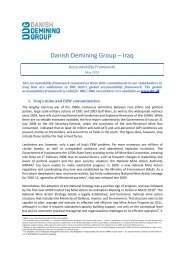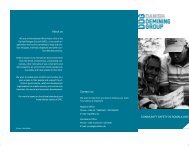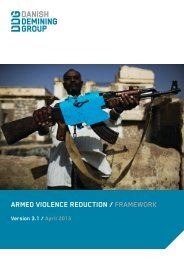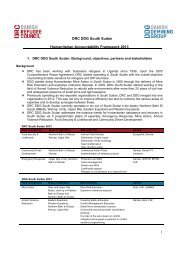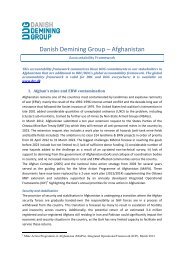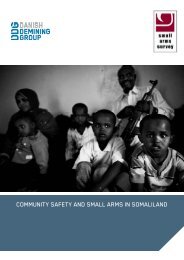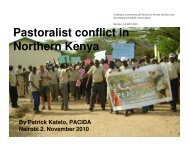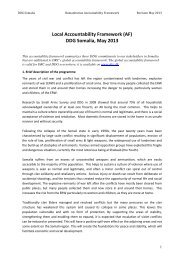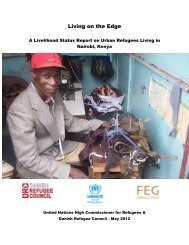Read the full report - Danish Refugee Council
Read the full report - Danish Refugee Council
Read the full report - Danish Refugee Council
Create successful ePaper yourself
Turn your PDF publications into a flip-book with our unique Google optimized e-Paper software.
56 DRC / DANISH REFUGEE COUNCILvulnerabilities of poor households to shocks through <strong>the</strong> creation and maintenance of assets,promoting livelihoods should look at:Enhancing beneficiaries’ productivity and employment opportunities: The efficiency of cashbasedintervention in reaching long-term outcomes is linked to <strong>the</strong>ir ability to enable cashtransfers beneficiaries to participate in o<strong>the</strong>r initiatives that promote sustainable livelihoods.Productive activities necessarily involve risks, which appear more threatening to <strong>the</strong> poorthan <strong>the</strong> better off, keeping <strong>the</strong>m in near-subsistence activities 47 . KIS inhabitants are fur<strong>the</strong>rfaced with considerable barriers in accessing <strong>the</strong> labour market and engaging in stableincome-generating activities, let alone productive ones. As underlined by <strong>the</strong> data collectedin our sample, as well as previous research 48 , lack of marketable skills, lack of supportingnetworks and discrimination prevent <strong>the</strong>m from entering <strong>the</strong> labour market and impede <strong>the</strong>iraccess to stable livelihood opportunities. In <strong>the</strong>se regards, both <strong>the</strong> existing economiccontext in Afghanistan, <strong>the</strong> social discrimination experienced by KIS inhabitants mightendanger <strong>the</strong> outputs of training programmes by training individuals unable to insert<strong>the</strong>mselves in <strong>the</strong> labour market. DRC should <strong>the</strong>refore look at promoting <strong>the</strong>se networksand connection throughout training programmes and after graduation. Building on DRC’sexisting experience in training should <strong>the</strong>refore prove effective. As training has until this dateachieved to have attendance without cash incentives, <strong>the</strong>re is no reason to introduce a cashcomponent that might attract individuals with less personal motivation: cash-for training doesnot appear as a relevant solution in <strong>the</strong> KIS. However, providing cash grants at <strong>the</strong> end oftrainings to allow beneficiaries to set up an income-generating activity and following-up <strong>the</strong>irprogression regularly can be a sustainable solution to ensure <strong>the</strong>ir transition out of <strong>the</strong>programme is effective and useful.Increasing beneficiaries’ capacity for consumption: However, poor households have riskmanagement strategies that can be supported by entering into low risk activities, diversifyingsources of income through activities with different risk profiles. 49 Both data collected for thisstudy and previous research 50 underlined <strong>the</strong> potential of involving women in productiveactivities in <strong>the</strong> KIS. By increasing access to skills and potentially diversifying sources ofincome- through training of women in <strong>the</strong> households in income-generating activities, forinstance, cash-for training can foster investment of household members in micro enterprisesbased on <strong>the</strong> demand of <strong>the</strong> market.3. Building on DRC’s existing programmesBased on a study of Solidarités International’s food-for-training programme in <strong>the</strong> KIS, a Samuel HallStudy Sustaining <strong>the</strong> Working Poor in Kabul Informal Settlements published in January 2013 anddiscussions with organization involved in training programmes, <strong>the</strong> implementation of a cash-fortrainingprogramme in <strong>the</strong> KIS should focus on <strong>the</strong> following elements:Cash should not be provided as a compensation for participation in training programmes:CEDO’s successful experience in providing trainings to over 2000 IDPs in <strong>the</strong> KIS withoutincentives (monetary or in-kind) show it is feasible, and prevents enrolment of individualsinterested in <strong>the</strong> food component ra<strong>the</strong>r than <strong>the</strong> acquisition of skills. A key element is toraise <strong>the</strong> awareness of <strong>the</strong> community about <strong>the</strong> benefits of <strong>the</strong> programme.Post-training assistance could be provided in <strong>the</strong> form of small grants: <strong>the</strong> major barrier toestablishing micro-enterprises is <strong>the</strong> start-up capital , including costs for machineries and47 FARRINGTON, J., HARVEY, P., and SLATER, R. (2005), Cash Transfers in <strong>the</strong> Context of Pro-Poor Growth, Discussionpaper for OECD/DAC Povnet Risk and Vulnerability Task Group, Overseas Development Institute.48 SAMUEL HALL CONSULTING (2012), Sustaining <strong>the</strong> Working Poor in <strong>the</strong> Kabul Informal Settlements, SolidaritésInternational.49 FARRINGTON, HARVEY, SLATER (Ibid).50 SAMUEL HALL CONSULTING (2012), Sustaining <strong>the</strong> Working Poor in <strong>the</strong> Kabul Informal Settlements, SolidaritésInternational.



